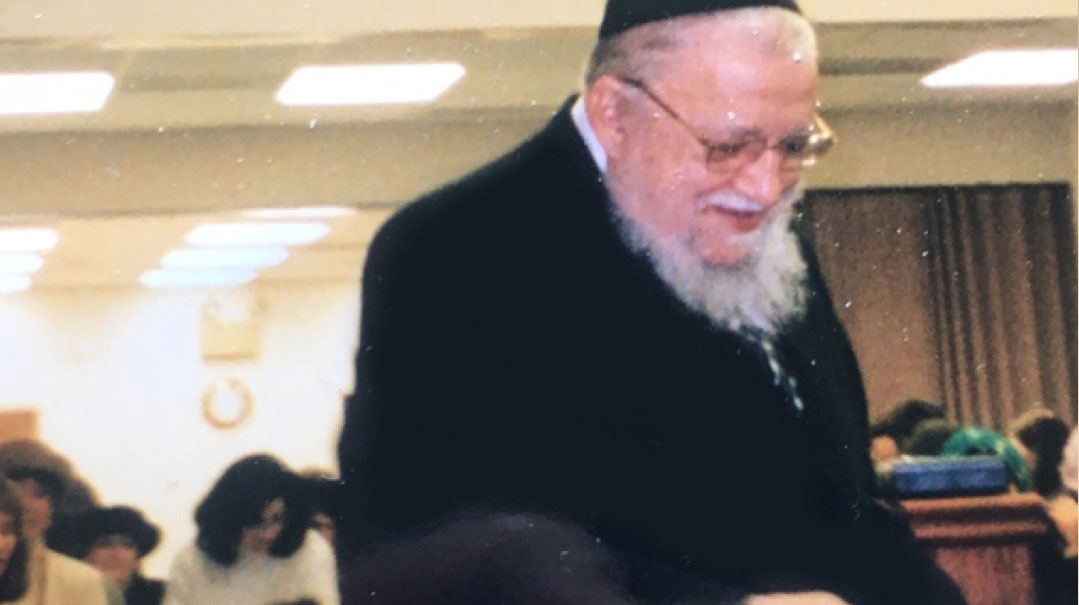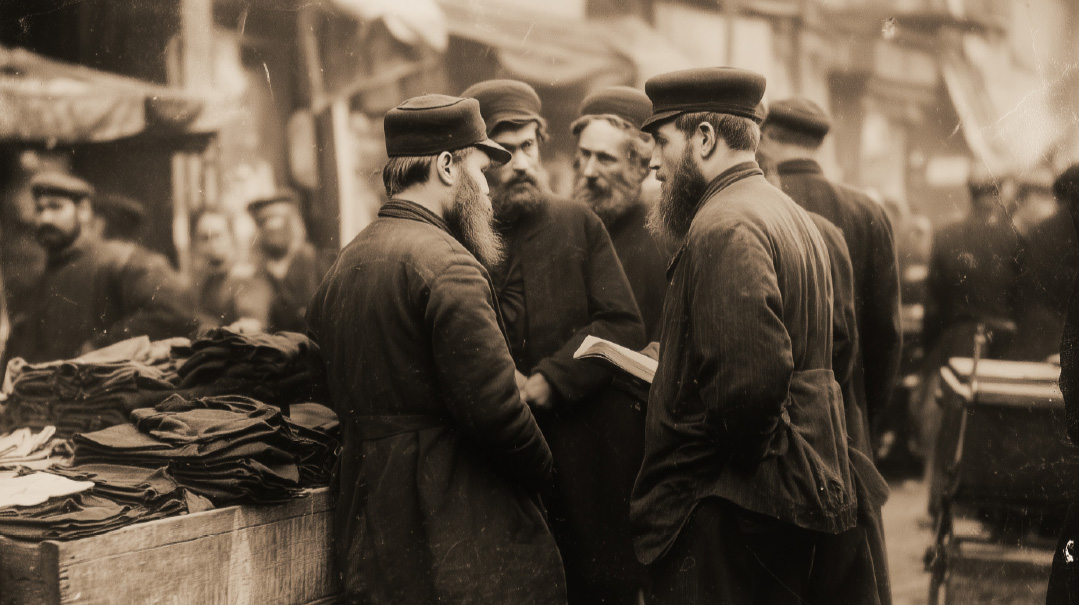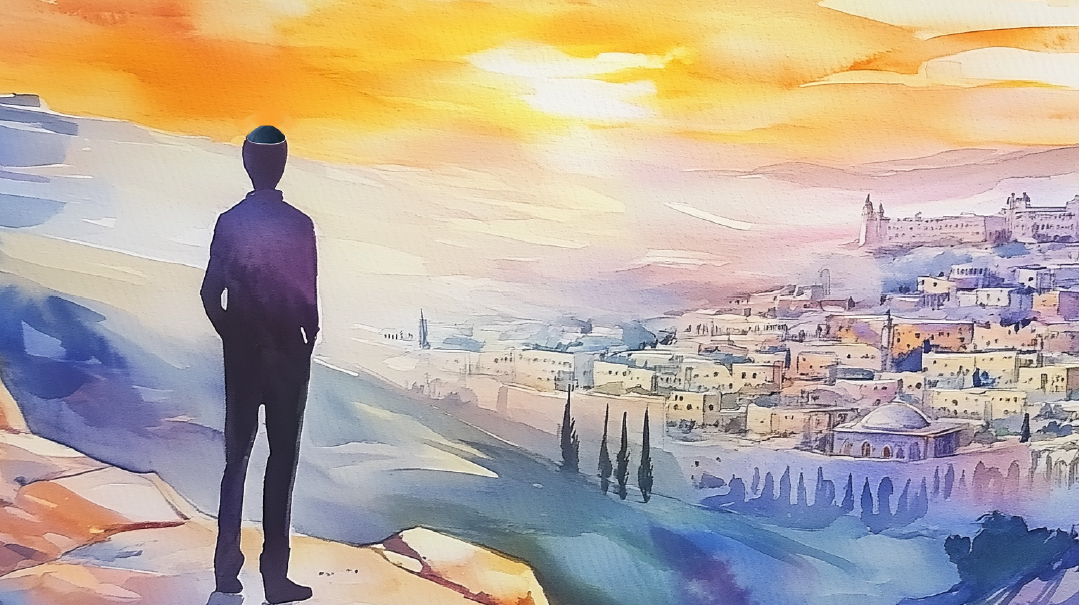The Road Less Traveled
| August 5, 2020Recollections of Rav Nachman Bulman ztz”l on his 18th yahrtzeit

When I returned to the University of Illinois in August of 1985 to complete my poli-sci degree, I was a totally different person than I had been when I left a year before. I had spent my junior year at the Hebrew University in Jerusalem, where I developed a passion for Torah learning that far eclipsed my interests in political theory, and I was returning as a shomer mitzvos.
It was a rough transition. The campus, set in the tall corn fields of downstate Illinois, seemed like the proverbial wilderness. With my modest dress and Torah worldview, I felt totally alone. It was my senior year and I was trying to strategize my next move in life. Finding a job in Washington D.C. seemed like the obvious next step, but there was an inner voice pulling me toward a different destiny.
During winter break, I joined my friends from Hebrew University for a reunion in New York. One of them was planning to spend a few days in Monsey at a school for newly observant women, and she invited me to join her. I was totally exhausted when we arrived, and when the madrichah announced a talk from a rabbi visiting from Israel, I thought I would probably fall asleep at the lecture.
I didn’t. The visiting rabbi was Rav Nachman Bulman zt”zl. He spoke about his dream to create a community for English-speaking olim in Israel. He described the challenges he faced trying to build a community in the lower Galil, and shared stories about sending members of the kehillah to teach Torah at local kibbutzim. I was spellbound as he recounted his struggle to win the trust of the local Russian immigrants and his success as the communities became allies. One story moved me immeasurably: there was a young American who had been involved in other religions and was staying at a kibbutz near Migdal Haemek. The members of Rav Bulman’s kehillah reached out to him and invited him to join them for Shavuos night learning. At daybreak, he approached Rav Bulman. “I spit out the poison,” he said simply. He maintained a connection with Rav Bulman, and eventually returned to a Torah lifestyle.
Rav Bulman’s insight and analysis of the trends in Israeli society was clear and incisive, and he understood the demographics of Israeli society better than any of my college professors. He spoke with great empathy and tolerance for Ashkenazim, Sephardim, secular, and religious communities. He inspired me with his hope for the future, telling us that the geulah will come in the end, and we should never despair.
Rav Bulman’s talk reignited my dream of living in Eretz Yisrael and my desire to live a life full of Torah. When the lecture ended, I had tears in my eyes. It was clear to me that I would leave the Midwest and head straight back to Israel after graduation.
I completed my degree and returned to Israel in August of 1986. I enrolled in an ulpan at Hebrew University, but I didn’t know what my next step should be. I felt lost. I needed help finding my direction in life.
I wanted to talk to Rav Bulman. I knew that if I could somehow find my way to his door, he would be able to help me figure it all out. But I didn’t have his phone number, and although I knew he had founded a community in Migdal Haemek, I had no idea where that was.
Hashem guided me. About a month after I arrived, I met a woman in Mattesdorf who told me she knew a family from Chicago who had moved to Rav Bulman’s community, Kiryat Nachliel. She called them, and they invited me for Shabbos.
That Shabbos began a new chapter in my life. I took the bus to Haifa and from there, another bus through the rolling green hills of the Jezreel Valley into the development town of Migdal Haemek. When I got off the bus, some children guided me to Rechov Nitzanim, where Rav and Rebbetzin Bulman lived.
Meeting the Bulmans was like meeting old friends. They welcomed me warmly and introduced me to Rebbetzin Bulman’s parents, who were living with them at the time. Over coffee and chocolate, I told Rav Bulman and his rebbetzin about my background and my journey to a Torah lifestyle. They listened intently and asked many questions. I told them that I really wanted to enroll in a seminary program, but I had no idea where to find a suitable place. Rav Bulman helped me come up with a plan that would fit my educational level and interest. I returned to Jerusalem with renewed confidence and started taking Torah classes at two different schools.
When I got engaged In January of 1987, I suggested to my fiancée that we visit Kiryat Nachliel to explore the possibility of living there. We got married in the spring of 1987 and moved to Rav Bulman’s kehillah in the summer.
Our third-floor apartment overlooked the lush green hills of the Emek Yisrael valley. My husband joined Rav Bulman’s kollel, led by Rabbi Shmuel Herman and Rabbi Yeshaya Borenstein. The families of the kehilla became our family, and the atmosphere was one of chesed and achdus. It was a shemittah year, and we had to live without many of the food items that we were accustomed to in America. We learned quickly that we could cope without many of the things we had considered essentials in the US, and that the joy of living in Eretz Yisrael was greater than any conveniences.
Rav Bulman gave many shiurim each week, and even traveled to Jerusalem to give shiurim at the Ohr LaGolah program. I attended his weekly parshah shiur for women. He would present questions in advance for us to work on b’chavrusa before the shiur. In his class, I learned many novel ideas that deepened my understanding of Torah and love of Eretz Yisrael. He taught us that the land of Israel had a body and soul, similar to a person. Each part of Israel represented a different aspect of this idea. I was a beginner in Torah study, but he simplified great ideas so all of us could grasp them.
On Friday nights, Rav Bulman gave a shiur on the history and hashkafah of misnagdim and chassidim. He always concluded this class with the singing of many Shabbos zemiros. I especially remember his melodious voice singing Tzamah Nafshi with tremendous emotion. When he davened from the amud (in the shul he helped renovate), it was always special — when I heard him utter the tefillah for rain on Shemini Atzeres, I thought it surely shook the heaven’s like the prayers of Choni Hame’agel.
I experienced a challenging pregnancy that year, and my doctor put me on bed rest for the last two months. The women of Kiryat Nachliel took turns cooking meals for us and gave me a lot of emotional support. We didn’t have a phone (getting a phone at that time was complicated), and even though the Rav had a heart condition, he and Rebbetzin Bulman made the long trek up the three flights of stairs to visit me and give me chizuk.
My daughter Esther Gila was born in the Afula hospital on Taanis Esther in March of 1988. Rebbetzin Bulman came to see me in the hospital the next day, on Purim. Her special smile, advice, and good humor were very helpful and meaningful at that tender time.
The following June, my husband and I returned to Chicago due to a health condition I developed. I felt a tremendous sense of loss; it was devastating to leave Israel and the kehillah.
In 1991, I was thrilled to learn that the Bulmans would be visiting Chicago. We invited them to stay with us for part of their visit. Several days before the Bulman’s arrival, my phone started ringing off the hook. People around the world wanted to seek Rav Bulman’s advice, and I became his secretary, arranging appointments for him throughout the day and night. Once the rav arrived, Chicago residents started to line up in my living room unannounced, waiting for a chance to speak with him. No matter how late it became, Rav Bulman made time for everyone.
On another visit to Chicago, we drove Rav Bulman to Milwaukee to visit Rabbi and Rebbetzin Twerski. It was a regular Thursday night, but when we entered their home, their table was set as if for Shabbos, with candles lit. They quoted Chazal, saying, “A talmid chacham is similar to Shabbos.”
Rav Bulman was a leader and a teacher his entire life. He led kehillos in the US and in Israel, and served as mashgiach ruchani at Yeshivah Ohr Somayach in Yerushalayim for many years. He translated several important works into English, and was the first editor of the Jewish Observer. He helped found the Sarah Schenirer high school in Boro Park as well as the Darchei Binah semimary in Jerusalem. Rav Bulman had a special patience for Klal Yisrael, ahavas chinam for every Jew. He was a fiery orator who often shed tears while speaking, and those tears evoked tears from his listeners. His eternal optimism for the future of the Jewish people is something that I will always hold onto, especially in times like these.
Nitzanim Street, where Rav Bulman and his followers lived, was a fitting name. Nitzan means a bud emerging from the ground in springtime. The mesirus nefesh and love that Rav Bulman and his Rebbetzin had for Klal Yisrael was similar to the trust that farmers have that their buds will one day produce an abundant harvest. My meeting with Rav Bulman that winter of 1985 was a turning point: Rav Bulman’s influenced shaped me and my future, as it did for so many others, bringing us closer to Torah and mitzvos in the land that he loved.
(Originally featured in Mishpacha, Issue 822)
Oops! We could not locate your form.







